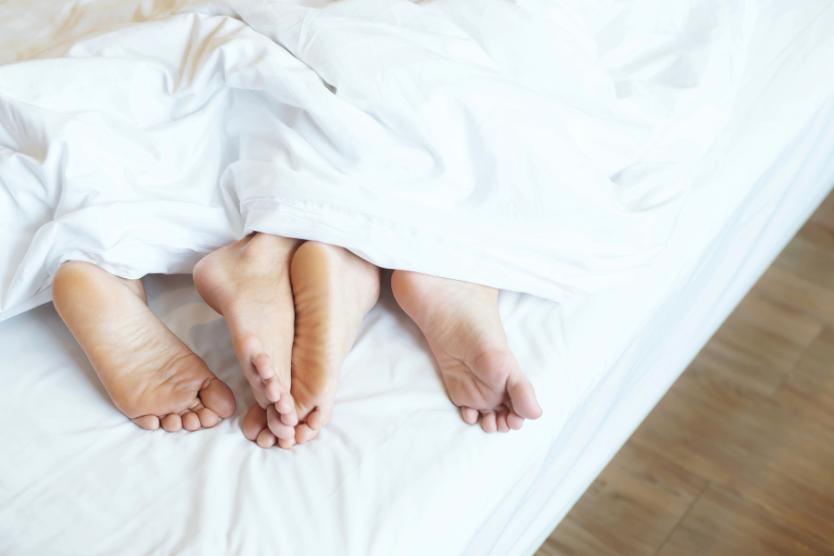Suffering from pelvic pain can be alarming, and raise concerns and questions.
There are common ailments that can cause pain, like a urinary tract infection. But sexually active women may wonder if too much sex can cause pelvic pain. And those who don’t have a partner may be wondering the opposite: can a lack of sex cause pelvic pain?
Let’s look at these two questions to get answers to your concerns about pelvic pain.
Can Too Much Sex Cause Pelvic Pain?
Is it an issue if you’re enjoying your partner a lot, whether you’re on your honeymoon or have been together for ages? What constitutes too much sex?
There’s no hard and fast answer to that question, but you might have some warning signs that you need a break. For instance, your body may not be able to produce as much moisture when you’re having frequent sex, resuting in vaginal dryness that comes with prolonged sexual contact and penetration. If you’re feeling friction or pain it could be a sign to take a night off.1 But that type of irritation is not the same as pelvic pain.
Too much sex could also be the cause of a urinary tract infection (UTI), which can lead to pelvic pain. If you experience pelvic pain in the centre of the pelvis and around the area of the pubic bone, for instance, you may have a UTI.2
Frequent sex could be a risk factor for a UTI as your vagina’s pH may be disrupted, or bacteria may be introduced into the urinary tract. 1 It seems that sexually active women do tend to have more UTIs than women who aren’t sexually active, and certain types of birth control and spermicidal agents can also be a risk factor.2
To help, empty your bladder before and soon after intercourse, and change your birth control method if you’re using a diaphragm or unlubricated or spermicide-treated condoms.2
There could be a more serious condition underlying your pain, however. Pelvic pain during or after sex can be a warning sign of a vascular disorder. Pelvic Congestion Syndrome is often overlooked and under-diagnosed, and is a vascular condition that mostly affects young women between the ages of 20-50 years.3
Watch for chronic pelvic pain lasting more than 6 months. The cause is large, dilated veins in the pelvic area due to improper blood drainage. The symptoms include a feeling described as “bowling ball stuck between the groin region.” It can also cause painful periods, pain during sex, or pain after sex.3
More common is the condition called dyspareunia, a persistent or recurring pain just before, during or after sex. The pain is felt in the genital region, with women feeling pain externally in the vulvar region, to the labia or at the opening to the vagina; or internally in the cervix, uterus or lower abdomen.4
There are various reasons for this condition, including vaginal or yeast infections, fibroids, endometriosis, pelvic inflammatory disease, and more.4 But too much sex doesn’t necessarily lead to dyspareunia.
However often you have sex, recurring pain is worth seeing a doctor, since there is a risk of an underlying condition.
Can Lack Of Sex Cause Pelvic Pain?
It’s OK if you aren’t sexually active, and it’s worth talking about if you have pelvic pain.
If you’ve been abstinent for a while, there are some changes to your body that may occur. For instance, you might suffer from vaginal dryness, which can sometimes cause itching or soreness, difficulty inserting tampons, and discomfort or pain if and when you resume having sex.5
You may also suffer from incontinence, since sex can help strengthen the pelvic floor muscles. The good news is this can be treated in ways other than having sex, such as doing pelvic floor exercises or even yoga.5
There are some who say that since sex increases blood flow to the genitals, it could help your immune system. But abstinence itself doesn’t physically damage you.6
So if you are not sexually active and you have pelvic pain, you may be suffering from a condition we’ve already mentioned, such as endometriosis, fibroids, or a UTI. The advice is the same as to a sexually active woman: see a doctor.
More About Pelvic Pain
Seek Diagnosis
Whether you have sex several times a day or you haven’t had sex in months, if you have pelvic pain, you should see a doctor. Use our Physician Finder to seek out a women’s health specialist if you experience pain during or after sex, or if you haven’t had sex and still suffer from pelvic pain. It’s important to diagnose and treat any health concern.




















